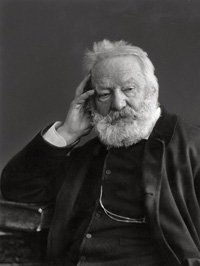Victor Hugo
 |
Victor Hugo (February 26, 1802 - May 22, 1885) was a French novelist, poet and playwright considered one of the greatest writers of all time. Worldwide he is best known for his novels Les Miserables (1862) and The Hunchback of Notre-Dame (1831). In France, he is known primarily for his poetry, especially his collections The Contemplations and The Legend of the Ages. Hugo was an early and influential voice in the Romantic Movement, achieving recognition with his plays, five volumes of poetry between 1829 and 1840 in addition to his novels. He was born the youngest of three boys to a freethinking republican and high-ranking officer in Napolean's army and his Catholic royalist wife. His childhood coincided with a period of intense political turmoil that was reflected in the opposing political and religious sentiments of his parents. After years of following her husband to postings, his mother separated shortly after Victor's birth and settled in Paris with her children. Her devotion to King and Faith dominated his upbringing; unsurprisingly, Hugo was a committed royalist as a young man. His views shifted over time, and he became a champion of Freethought and Republicanism, spurred by the events of the 1848 Revolution. Hugo left France in 1851 after Napolean III's coup d'etat, settling in the Channel Islands of Jersey in 1852 and then Guernsey in 1855, where he lived until 1870, when returned to France after Napoleon III fell from power. His work was immensely popular, always on the cutting edge of artistic trends and dealing directly with the issues and events of his time. His many honors include his portrait on French currency and his burial in the Pantheon in Paris.
|
The Hunchback of Notre-Dame
Hunchbacks. We stare. We cringe. We shudder. We think: the poor guy; glad that’s not me. Whether..
$13.99

